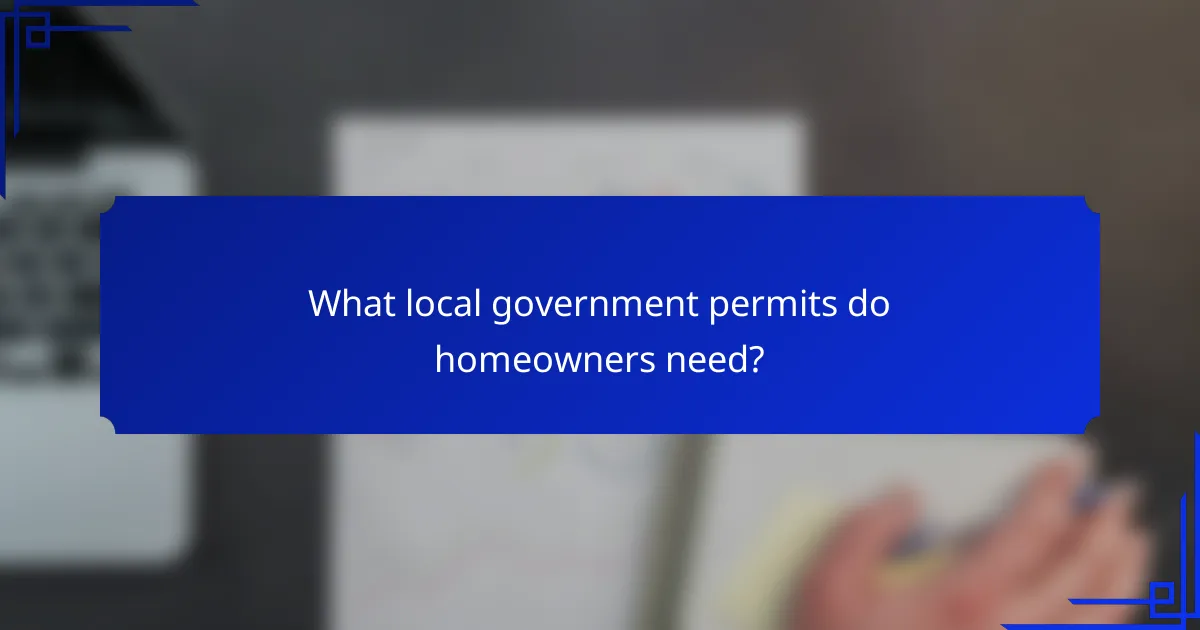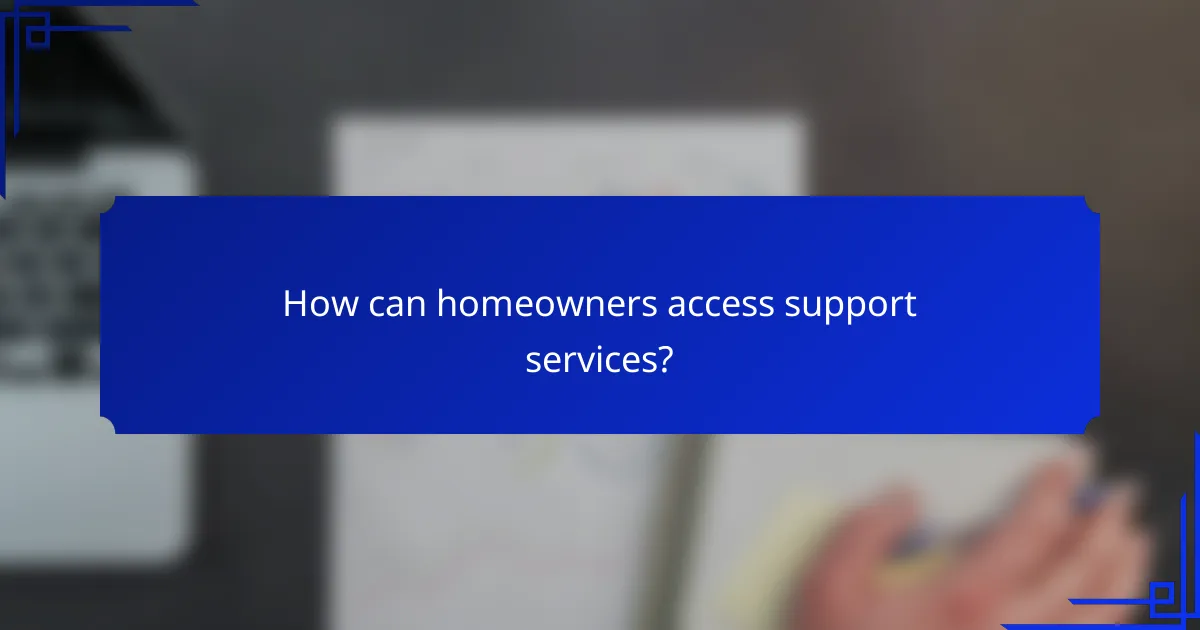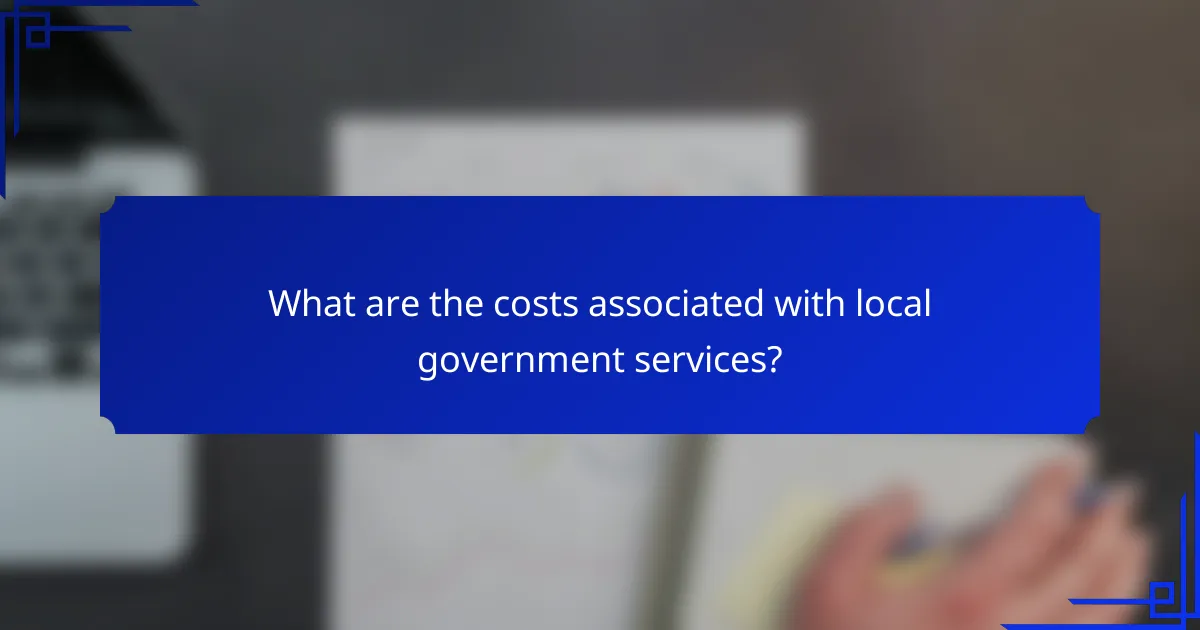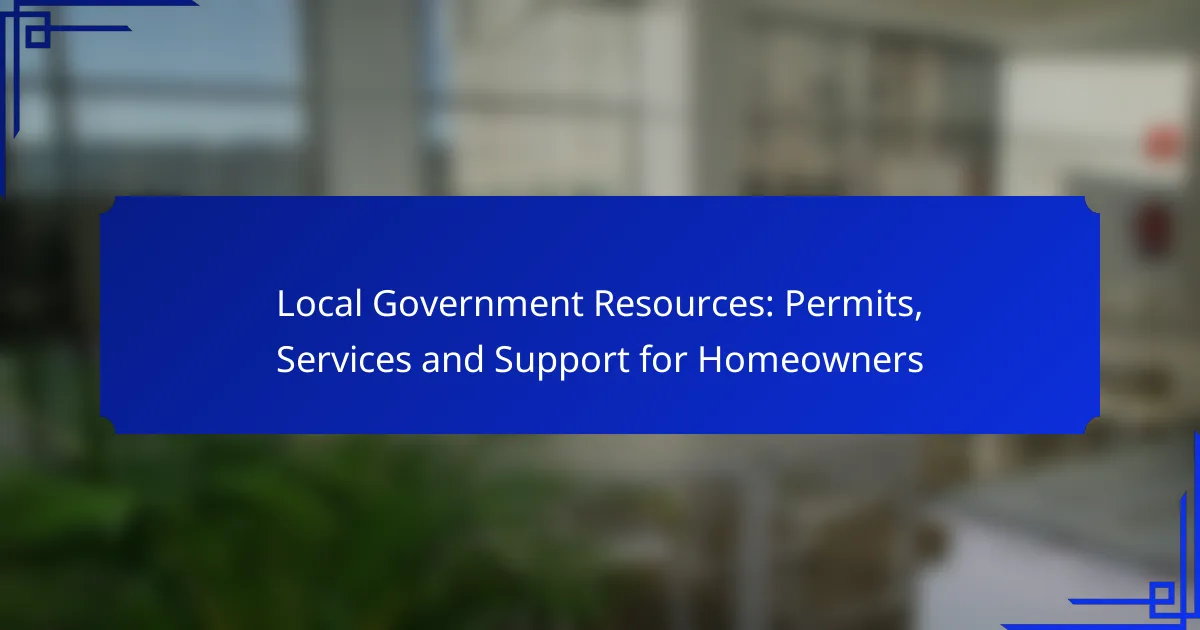Local government resources are crucial for homeowners seeking permits and services related to construction and renovation projects. Understanding the types of permits required, such as building, electrical, and zoning permits, is essential for compliance with local regulations. Additionally, municipalities offer various services, including waste management and community development programs, to support homeowners and enhance the overall quality of life in the community.

What local government permits do homeowners need?
Homeowners typically need various local government permits to ensure compliance with building codes and regulations. These permits may include building, electrical, plumbing, renovation, and zoning permits, each serving a specific purpose in the construction or renovation process.
Building permits
Building permits are essential for any significant construction or renovation project. They ensure that the work complies with local building codes and safety standards. Homeowners should apply for a building permit before starting any structural changes, such as adding rooms or altering foundations.
To obtain a building permit, homeowners usually need to submit detailed plans and specifications of the proposed work. Fees can vary widely based on the project size and local regulations, often ranging from a few hundred to several thousand dollars.
Electrical permits
Electrical permits are required for any electrical work, including installations, upgrades, or repairs. These permits help ensure that all electrical systems are safe and up to code, reducing the risk of hazards such as fires or electrocution.
Homeowners should hire a licensed electrician for any significant electrical projects, as they will typically handle the permit application process. Permit fees for electrical work can vary, often falling between $50 and $200, depending on the complexity of the job.
Plumbing permits
Plumbing permits are necessary for any work involving water supply, drainage, or sewage systems. This includes installing new plumbing fixtures, relocating pipes, or making repairs. Securing a plumbing permit ensures that the work adheres to health and safety regulations.
Similar to electrical permits, homeowners should engage a licensed plumber to manage the permit application. Fees for plumbing permits can range from $40 to $150, influenced by the scope of the plumbing work being performed.
Renovation permits
Renovation permits are required for significant alterations to existing structures, such as remodeling kitchens or bathrooms. These permits ensure that the renovations comply with local building codes and do not compromise the integrity of the home.
Homeowners should check with their local government to determine if a renovation permit is necessary for their specific project. The cost of renovation permits can vary widely, often between $100 and $500, depending on the extent of the changes being made.
Zoning permits
Zoning permits are crucial for ensuring that a property complies with local zoning laws, which dictate how land can be used. Homeowners may need a zoning permit for projects that change the use of the property or its physical footprint, such as building a new structure or converting a garage into living space.
To obtain a zoning permit, homeowners must submit an application that outlines the intended use and any structural changes. Fees for zoning permits can vary significantly, typically ranging from $50 to several hundred dollars, based on local regulations and the nature of the project.

How to apply for local government permits?
Applying for local government permits typically involves submitting an application to your municipality, either online or in person. The process may vary based on the type of permit and local regulations, so it’s essential to understand the specific requirements for your area.
Online application process
Many local governments offer an online application system for permits, allowing homeowners to submit requests conveniently. To start, visit your local government’s official website and navigate to the permits section. You may need to create an account to access the application forms.
Once logged in, fill out the required fields, upload any necessary documents, and pay applicable fees using a credit or debit card. After submission, you should receive a confirmation email with details about your application status.
In-person application steps
If you prefer to apply in person, visit your local government office during business hours. Bring any required forms and documentation, as staff can assist you in completing the application on-site. Be prepared to pay any fees in cash, check, or card, depending on the office’s payment policies.
After submitting your application, ask for a receipt or confirmation of submission. This can help track your application and provide proof of your request.
Required documentation
The documentation needed for a permit application can vary widely depending on the type of permit. Commonly required documents include proof of ownership, site plans, and any relevant inspections or surveys. Check your local government’s website for a specific list tailored to your permit type.
Additionally, ensure that all documents are current and clearly legible. Missing or unclear documentation can delay the approval process, so double-check your submission before applying.

What services do local governments offer to homeowners?
Local governments provide a variety of essential services to homeowners, including waste management, public safety, and community development programs. These services are designed to enhance the quality of life, ensure safety, and support sustainable growth within the community.
Waste management services
Local governments typically manage waste collection, recycling, and disposal services. Homeowners can expect regular curbside pickup for household waste, often on a weekly basis, along with designated days for recycling and yard waste.
Many municipalities offer guidelines on what can be recycled and how to properly dispose of hazardous materials. It’s important for homeowners to familiarize themselves with these regulations to avoid fines and ensure effective waste management.
Public safety services
Public safety services include police, fire, and emergency medical services, all crucial for maintaining community safety. Local governments often provide resources like neighborhood watch programs, fire safety education, and emergency preparedness training for residents.
Homeowners should take advantage of these services by participating in community safety initiatives and staying informed about local emergency plans. This proactive approach can significantly enhance personal and community safety.
Community development programs
Community development programs focus on improving local infrastructure, housing, and public spaces. Local governments may offer grants or low-interest loans to homeowners for renovations, energy efficiency upgrades, or new construction projects.
Homeowners should explore these opportunities as they can lead to increased property values and enhanced living conditions. Engaging with local planning meetings can also provide insights into upcoming projects and available resources.

How can homeowners access support services?
Homeowners can access support services through various local government resources designed to assist with permits, community programs, and essential services. These resources include official websites, community centers, and dedicated helplines that provide information and assistance tailored to homeowners’ needs.
Local government websites
Local government websites serve as a primary resource for homeowners seeking information on permits, zoning regulations, and available services. These sites typically offer downloadable forms, guidelines, and contact information for relevant departments.
Homeowners should regularly check their local government website for updates on policies and programs that may affect their property. Many municipalities also provide online portals for submitting permit applications, which can streamline the process significantly.
Community resource centers
Community resource centers are valuable hubs where homeowners can access a range of support services, including workshops on home improvement, financial assistance programs, and legal advice. These centers often collaborate with local agencies to provide comprehensive resources.
Visiting a community resource center can help homeowners connect with local experts and other residents facing similar challenges. Many centers offer free consultations or low-cost services, making them an economical option for obtaining assistance.
Helplines and hotlines
Helplines and hotlines are essential for homeowners needing immediate assistance or guidance on specific issues. These services often provide 24/7 support for urgent matters, such as housing crises or emergency repairs.
Homeowners should keep a list of relevant helplines, including those for housing assistance, legal aid, and emergency services. Utilizing these resources can help homeowners navigate complex situations and access vital support quickly.

What are the costs associated with local government services?
The costs associated with local government services can vary widely depending on the type of service and the specific locality. Homeowners should be aware of several key expenses, including permit fees, service charges, and property taxes, which can significantly impact their overall budget.
Permit fees
Permit fees are charges homeowners must pay to obtain the necessary approvals for construction, renovation, or other significant changes to their property. These fees can range from a few dozen to several hundred dollars, depending on the scope of the project and local regulations.
It is essential to check with your local government office for specific fee schedules, as some municipalities may have tiered pricing based on project size or complexity. Additionally, consider potential costs for inspections that may be required during the permitting process.
Service charges
Service charges encompass various fees for services provided by local governments, such as waste management, water supply, and emergency services. These charges can be structured as monthly or annual fees and may vary based on property size and usage levels.
Homeowners should review their local government’s fee schedule to understand what services are included and any additional charges that may apply. Being aware of these costs can help in budgeting for monthly expenses and avoiding unexpected bills.
Property taxes
Property taxes are annual taxes levied on real estate by local governments, based on the assessed value of the property. These taxes can vary significantly by location, often ranging from 0.5% to 2% of the property’s value, depending on local tax rates and assessments.
Homeowners should regularly review their property tax assessments and understand the local tax structure, as changes in property value or local tax rates can affect their tax bills. It may also be beneficial to explore potential exemptions or reductions available for specific homeowner categories, such as seniors or veterans.
